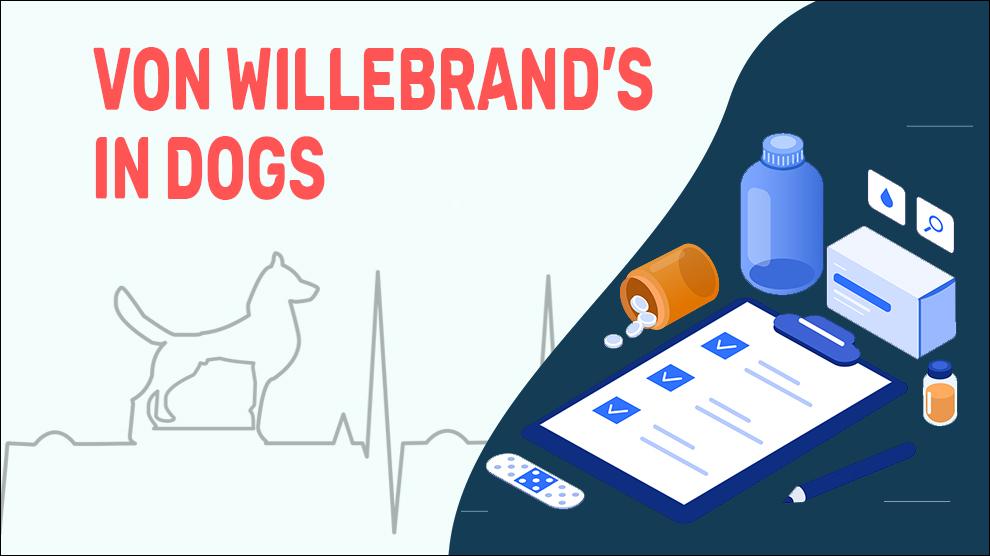What Is Von Willebrand’s In Dogs?
Von Willebrand's disease (vWD) is a clotting disorder that is caused due to defect in platelet function, from the deficiency of von Willebrand factor (vWF), a glycoprotein needed to help platelet adhesion to damaged vascular subendothelium at the site of vessel injury. vWD is the most common blood clotting disorder among canines and is present in several breeds.
The most commonly found symptom is extended bleeding after surgeries (like spaying). Sometimes, there will be no outward symptoms in dogs. Affected dogs will suddenly hemorrhage from the nose, mouth, bladder, or vagina. The precursor to a bleeding event is usually ‘stress’.
This association of stress has also been proved in the disorder in humans as well. This would make clear why dogs with one or two copies of the mutant gene reveal symptoms sometimes while at other times they do not, if ‘stress’ is an essential component for this bleeding disorder.
Due to the shocking frequency of Doberman Pinschers affected, dobes of any gender should first be screened to see if they are vWD carriers. Before getting a Doberman of unknown lineage, check at least the medical history as this disease can be diagnosed with a DNA test or special blood test.
Symptoms Of Von Willebrand’s In Dogs
- Excessive, Spontaneous bleeding
- Redness or discoloration of the skin
- Epistaxis (Nosebleeds) / Nosebleeds that seem to have no cause
- Swelling / Excessive bruising
- Prolonged bleeding from ordinary cuts or dental work
- Blood in the urine (hematuria) or stool (Hematochezia)
- Vision problems, such as double vision
- Extreme fatigue
- Nausea and vomiting
- Painful headaches
- Sudden pain and/or swelling in muscles or joints
Treatment Options For Von Willebrand’s In Dogs
- No treatment is necessary until the dog is stable.
- Plasma transfusions or medications to help the blood clotting can be used to reduce the damage.
- For pets experiencing extreme bleeding due to Von Willebrand’s, plasma transfusion into the dog’s blood is done to reintroduce blood clotting elements.
- Anti-inflammatory medications.
- Pain Control Medications such as NSAIDs.
- Antibiotics will be used to control infection and inflammation.
Home Remedies For Von Willebrand’s In Dogs
Always monitor for any irregularities and check with your vet as soon as possible.
Supportive therapies can be done at home and can include clotting medications, topical medications, antibiotics, oral antihistamines, and complementary treatments.
How To Prevent Von Willebrand’s In Dogs?
It is unable to prevent Von Willebrand disease as it is caused mainly due to hereditary abnormality. The only way is to stop the breeding of affected dogs so that the risk of passing the condition on to the next generation is averted.
Affected Dog Breeds Of Von Willebrand’s
Doberman Pinscher, German Shepherd, Golden Retriever, Poodle, Shetland Sheepdog, Chesapeake Bay Retriever, Scottish Terrier, Akita, Basset Hound, German Wirehaired Pointer, German Shorthaired Pointer, Pembroke Welsh Corgi, Miniature Schnauzer, Standard Poodle, Standard Manchester Terrier, Welsh Corgi
Causes And Types For Von Willebrand’s In Dogs
1. Causes:
Congenital: Von Willebrand’s Disease is the most widespread, hereditary, heterogeneous, bleeding disorder.
Some dogs may have only one copy of the mutant gene of Von Willebrand’s disease and they may show no clinical symptoms. Affected dogs that possess two copies of the mutant gene are the most severely affected ones. In some cases, dogs that possess genes may appear unaffected earlier in their life but show symptoms in later stages.
2. Types:
- Type 1: Most common type of vWD disease. vWF will be lower-than-normal levels. The dog may experience mild bleeding problems but be able to live a normal life.
- Type 2: vWF has normal levels and there will be structural and functional defects.
- Type 3: This is the most serious type of von Willebrand disease. As Platelets cannot clot and this will put the dogs at risk of severe bleeding that’s hard to stop.
3. Mortality:
Von Willebrand disease incidence is highly common. This is actually a mild and lifelong condition. Sometimes, uncontrolled bleeding in dogs can result in death.
4. Diagnosis:
- Complete blood count and Serum biochemical study
- Urinalysis and Fecal analysis
- Coagulation function
- Platelet count
- Smear evaluation
- Clot retraction
5. Prognosis:
The prognosis for recovery for dogs diagnosed with Von Willebrand disease is guarded with today's medications available. Although there is no known cure for vWD disease in dogs, most dogs enjoy a pain-free life with long-term medication.
When To See A Vet For Von Willebrand’s In Dogs?
Time to visit the vet clinic for an examination, if you notice any of the following:
- Excessive, Spontaneous bleeding
- Redness or discoloration of the skin
- Epistaxis (Nosebleeds) / Nosebleeds that seem to have no cause
- Swelling / Excessive bruising
Food Suggestions For Von Willebrand’s In Dogs
What to feed?
- Leanest cuts of meat
- Provide easy-to-digest fatty proteins like beef, lamb, turkey, fish, and chicken
- Lukewarm (never hot) chicken soup, white rice with chicken breast, and steamed vegetables
- Organ meats like beef kidney, liver, chicken hearts and chicken gizzards
- Vitamin K supplements: Spinach, broccoli, cabbage, liver(raw or cooked), egg yolks, etc
Conclusion
Von Willebrand's disease requires lifelong management and is often not “cured.” After the initial treatment, monthly check-ups are recommended and bleeding has to be closely monitored. Medications have to be administered according to the vet’s instructions.

















